Professionally, I come from a weird-ish background – a Bachelors in Electronics Engineering and a Masters in Communications (Arts), along with almost a decade of experience in content and communications.
This also means that I have a strong affinity for technology, along with being excited about how well an idea is communicated. Even my present-day job is a good mix of both. I work with an AI and data science institute as their Senior Communications Coordinator, making sure that all the amazing hardcore tech research they do is brought in front of the world in the simplest of words.
All these years I have worked a lot in trying to encourage STEMM education – both at the pre-University and University level, through my work with IEEE. And I’ll always continue to do that. But it was in 2020 I realized that I wasn’t actually doing much for the community I was working in – the PR and communications industry. And that’s when I started this blog to act as a resource for early career PR and comms professionals.
2 years in, might I semi-arrogantly say that the response has been good, albeit there’s more I can do.
In late 2020 I wrote an article interviewing recent international students in Australia, working in the field of PR/comms. The article was very well received, and to date remains one of the popular ones on this blog.
I wanted to continue on that trend of making more and more voices, opinions and insights heard from professionals in this industry and hence decided to come up with this International Women’s Day special.
5 Women Leaders in the PR and Communications Industry in Australia
I reached out to 5 amazing women leaders in the public relations/communications industry across Australia and requested them to share some of their experiences and insights.
These inspiring women come from different sectors – tertiary education (both academic and professional), agency, health, and advocacy; and offer us incredible collective wisdom.
While they all do come from varying sectors, one factor unites them all – each one of them is a PR/comms leader in their own right.
Dr Kate Fitch – Monash University
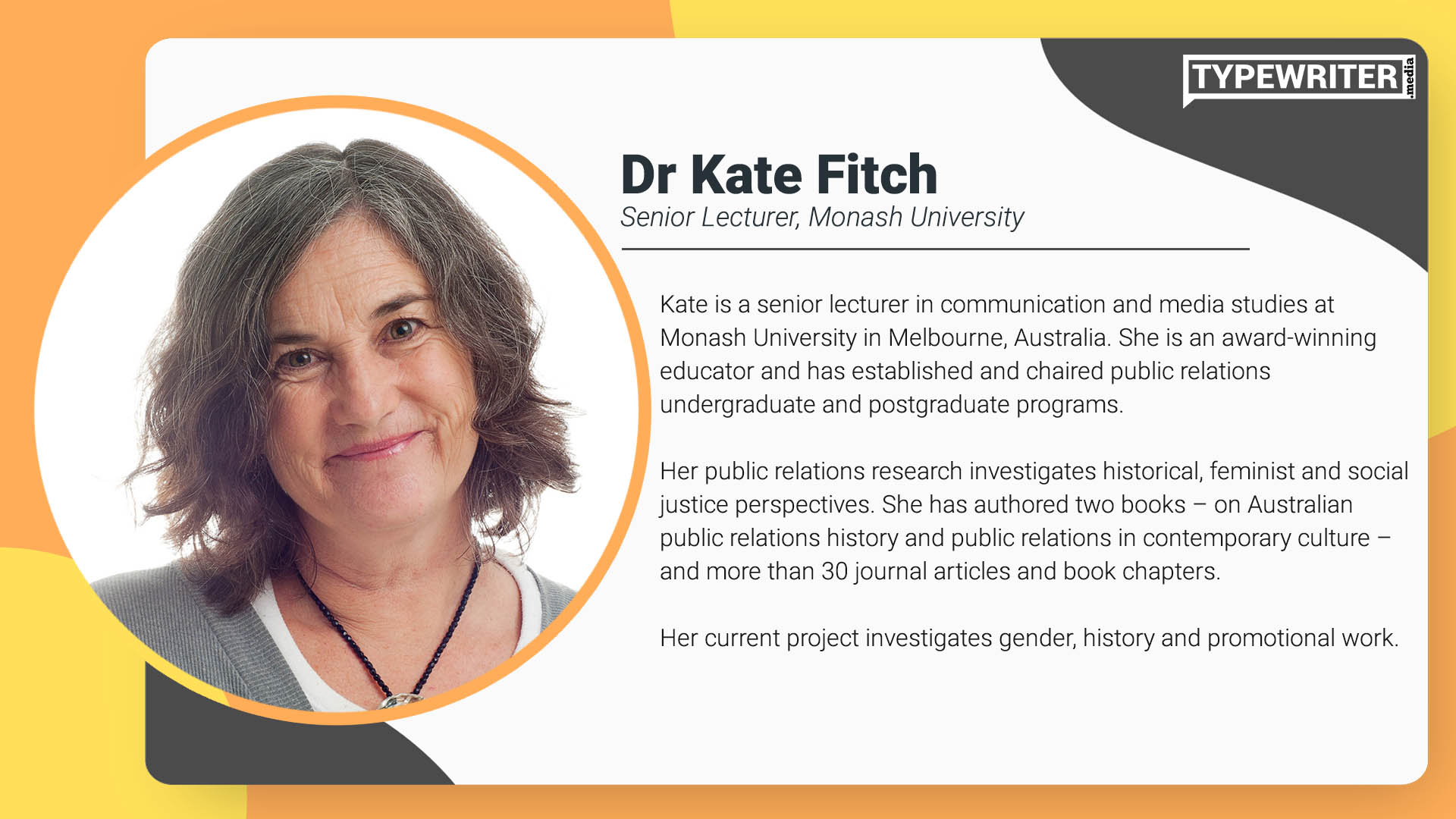
What made you choose the PR/Comms field as a career path?
I wanted to work in book publishing and my first job was publicity assistant. After returning to Australia from the UK, I worked in promotional roles in the performing arts (contemporary dance and theater) before consulting mostly for the arts and government sectors.
I worked on different festivals, such as the Fremantle Buskers Festival, and consulted for various dance companies. Then a university asked me to help develop their first unit in public relations and that led to an academic career where I have focused on teaching and researching public relations.
As a woman in the PR/Comms industry, what was your biggest learning over the last two years of the pandemic?
Everyone is doing it tough and you never know what’s going on for others. So be kind. There was so much anxiety, but also a lot of laughter and collective spirit. Overall, people proved to be remarkably resilient. And now workers everywhere are reassessing their priorities.
Perhaps, surprisingly, the pandemic has improved the reputation of public relations and communications, particularly around internal/employee comms and health comms.
In this era where more and more people are looking for tech jobs, and fewer people are moving into the arts/humanities sector, what would be your advice to someone who is planning to pursue PR/Communication as a career?
Work out what matters to you and where you want to work! Communication expertise is highly transferable so you can work in tech PR, or in science comms, or do advocacy work.
If you love sport or fashion, you can work in those industries. If you want to make the world a better place, there are lots of opportunities for communicators to work in advocacy, environmental, and campaign roles (see https://www.ethicaljobs.com.au).
I fell into a communication role initially because I wanted to work in the arts and cultural sector. But it led to other opportunities in the public sector as I then worked in festival and public relations roles for local government, and undertook contracts for the state Department of Culture and the Arts. It worked in my favour that I could write and edit anything from annual reports and newsletters to promotional materials. I understood how to pitch a story to the media and develop a comms strategy; and worked closely with stakeholders ranging from corporate sponsors and government funders to community and arts organizations.
Thought leaders you’d recommend to follow on social media.
I have 3 suggestions for strong communicators to follow – all working towards social change.
- Sally Rugg: activist and digital campaigner
- Jaelea Skehan: suicide prevention and mental health advocate
- Amy McQuire: writer, journalist, Indigenous rights
Azadeh Williams – AZK Media
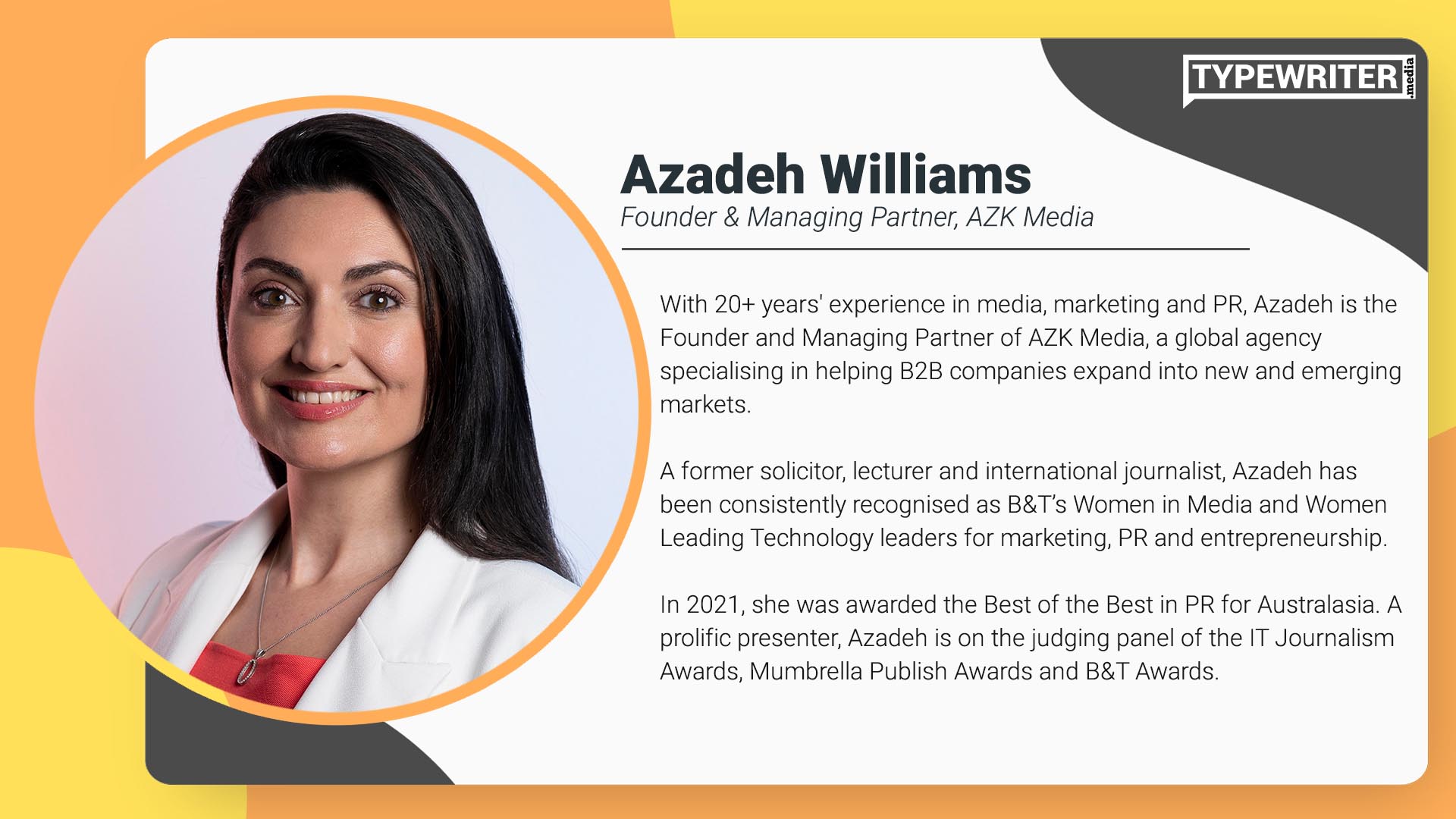
What made you choose the PR/Comms field as a career path?
Back in the day when I was a global business and technology journalist travelling the world, I spotted some serious problems in large enterprise B2B company’s media and marketing strategies.
B2B organizations were wasting thousands, if not millions in ads, sponsored content, and booths at events that were generating little ROI – and were entrusting their PR campaigns to agencies that didn’t understand the nuances of complex technology, data, and AI messaging. So I started AZK Media to disrupt the status quo.
At AZK Media, we have an innovative approach to media and marketing, where we integrate lead generation activities (webinars, white papers, reports), with video marketing, podcast production, social media, PR, and customer advocacy.
We’re not a ‘pure play’ PR firm. We believe PR forms one component of the wider, complex inbound marketing mix. Our ‘marcomms’ approach is designed specifically to cut ad spend, reduce sales lead times, drive real, organic demand, and cut the stress and pressure placed on internal marketing teams.
As a woman in the PR/Comms industry, what was your biggest learning over the last two years of the pandemic?
Perhaps not so much as a ‘woman’ but more so as a ‘female leader’, the pandemic has taught me to become far more resilient, draw clear boundaries on work and personal life, create smarter workflow designs, and also learn to say ‘no.’
Often female leaders fall into the trap of having to constantly ‘prove their worth,’ taking on more workload and responsibilities than their male counterparts. I learned to work smarter, focus on my wellbeing, be more in tune with my authentic self – and not get ‘too wrapped up’ in the weeds of growing a business in a pandemic.
In this era where more and more people are looking for tech jobs, and fewer people are moving into the arts/humanities sector, what would be your advice to someone who is planning to pursue PR/Communication as a career?
I would say learn the art of data-driven marketing and PR, as machine learning and AI will continue to have a huge impact in how we execute and measure great PR campaigns at scale.
I would also say don’t be afraid of B2B or technology PR. It’s often considered too ‘buttoned up and boring’ compared to B2C campaigns, but B2B is changing fast, and is ripe for creative innovation.
Thought leaders you’d recommend to follow on social media.
Signup for Typewriter.Media’s content and communications newsletter.
Ramya Manoharan – Futurity Investment Group
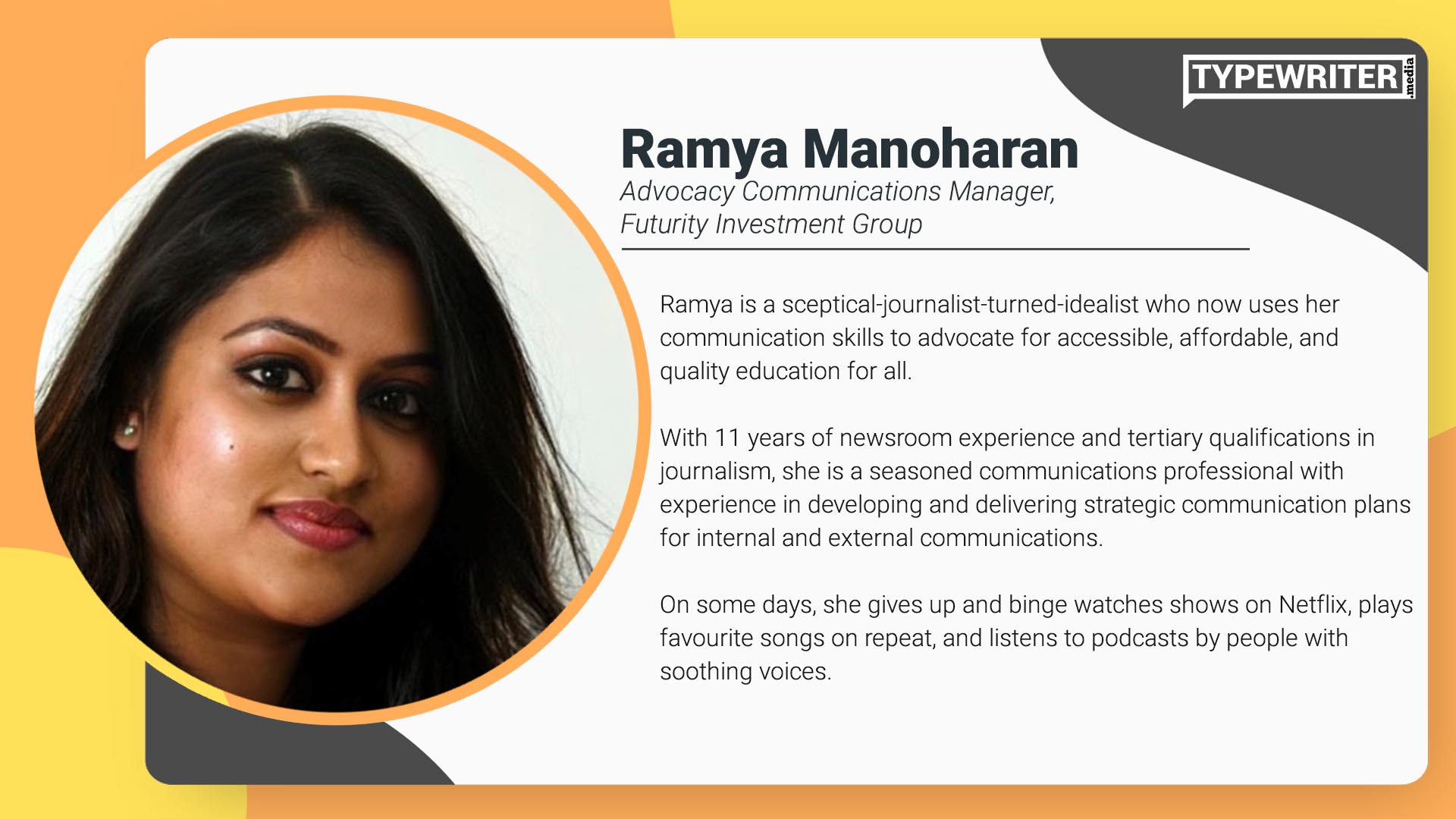
What made you choose the PR/Comms field as a career path?
I have a journalism background and my 11-year stint as a print journalist in one of the leading dailies in India was an exciting and hugely satisfying phase of my career that I never wanted to end. When I moved to Australia, however, I found the news media landscape different – both uninteresting and uninviting – so it was a mutual parting of ways and time for change.
In my reporting days, I specialized in development journalism with a focus on education and child rights. This experience drew me towards advocacy communications in the education sector.
As a woman in the PR/Comms industry, what was your biggest learning over the last two years of the pandemic?
If there were any doubts about the importance of communication earlier, the pandemic eliminated them. The more we were pushed into isolation, the more we felt the need to reach out and engage with each other – possible only through effective communication, which helped governments engage with citizens, organizations with employees, family and friends with each other. I am now convinced that I think, speak and listen, therefore I am!
I enjoyed the prominence of my role during this time, but it came with a loss of work-life balance because I failed to set clear boundaries between the two while working from home.
We head back to the office soon, and while I will miss the many conveniences of working from home, I feel it will help me get my life back in some ways, and help reinforce the idea of working in a team towards a common goal.
In this era where more and more people are looking for tech jobs, and fewer people are moving into the arts/humanities sector, what would be your advice to someone who is planning to pursue PR/Communication as a career?
Call me a cynic, but I believe that except for a blessed few for whom genius meets passion, the rest of us mere mortals cannot expect passion alone to carry us to the top of our chosen profession.
Choosing a career wisely, ensuring it falls within the subset of one’s interests/passion, skills, attitude towards life or value system, and lifestyle choice will make your professional life easier, sustainable, and more enjoyable in the long run. Having said that, who am I to kill your dreams? Go for it!
In a tough job market when traditional PR and communications roles are hard to come by. Particularly for fresh graduates with no experience, it helps to broaden the scope of your work and be open to participating in the gig economy.
There are endless opportunities for someone who can find an opportunity in every pothole in today’s world, where everyone is expected to be everything. For example, a life coach doesn’t just have to be good at their job, they also have to be good at blogging and social media messaging to gain visibility among potential clients. Cue, your entry!
Thought leaders you’d recommend to follow on social media.
My personal favourite is Jessica Chen, CEO of Soulcast Media. She offers great cross-cultural communications advice.
The next two recommendations are unlikely choices but are personal favourites because they reflect the art of communicating with empathy.
- Susan Cain – author of Quiet.
- Anthropocene Reviewed podcast by John Green, author of The Fault in Our Stars.
Jane Kneebone – Quit Victoria
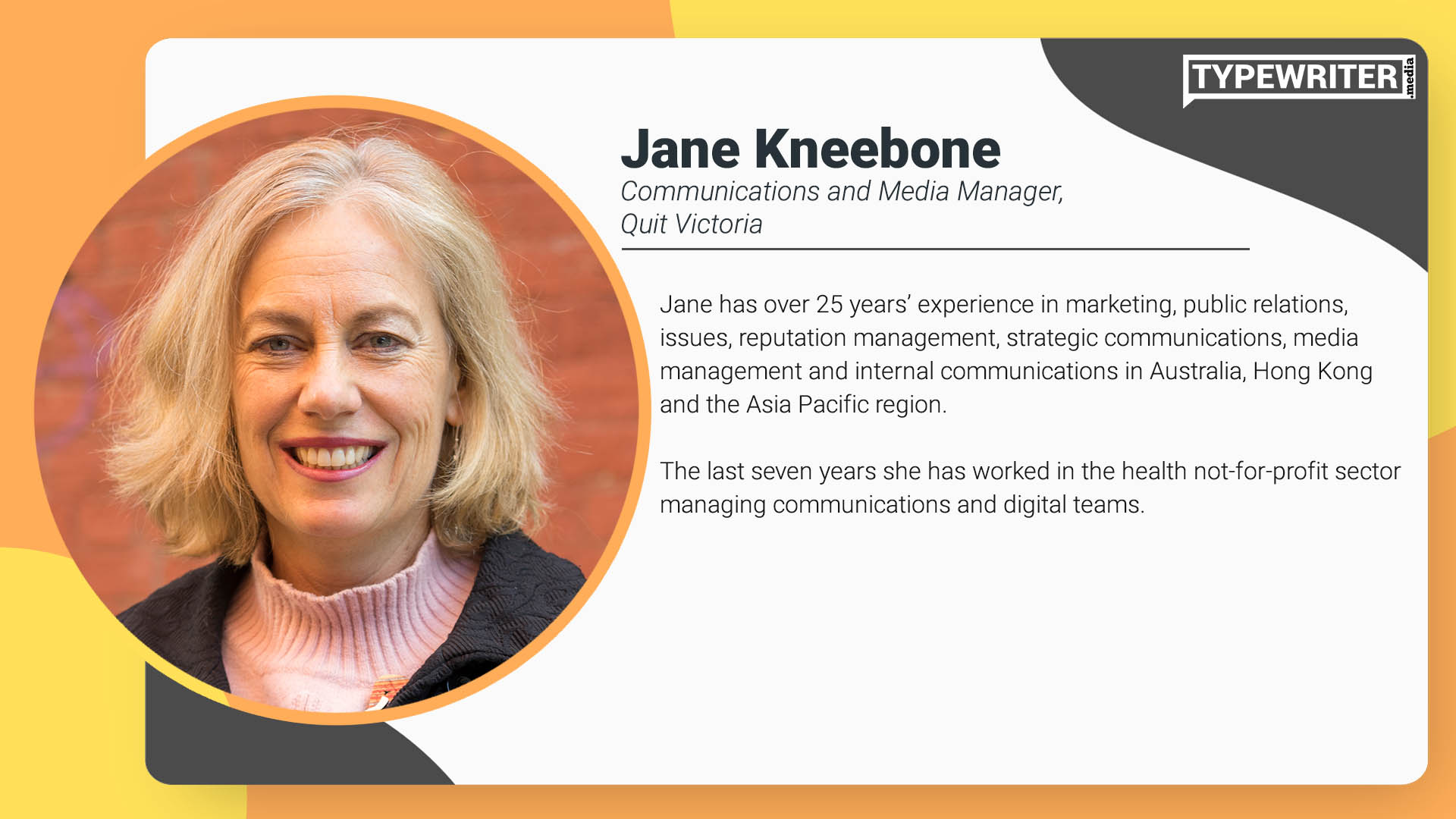
What made you choose the PR/Comms field as a career path?
I started my career in Marketing and Business Development but felt better suited to Communications as I like people, working with the media, and awareness-raising work.
I was given the opportunity to work in Hong Kong in an Asia Pacific Communications role where I helped a professional services organization re-brand across the Asia Pacific Region and manage different countries’ media and awareness-raising programs. It was a good insight into the diverse world of communications.
As a woman in the PR/Comms industry, what was your biggest learning over the last two years of the pandemic?
During the pandemic, I was working in a health not-for-profit managing a team of six people. We worked like an internal agency for the organization, developing awareness-raising campaigns, producing web content, video content, graphic design material, and digital communications.
During this time, the team worked from home and one worked interstate as they chose to return to be with family. I arranged one on one weekly meetings with each team member (via MS Teams) and the team met each Monday morning to reflect on their weekends, how they were feeling in such uncertain times, and generally supported each other.
My two key learnings were maintaining connectivity and not assuming the pandemic affected everyone the same way.
In this era where more and more people are looking for tech jobs, and fewer people are moving into the arts/humanities sector, what would be your advice to someone who is planning to pursue PR/Communication as a career?
I strongly suggest students and graduates investigate ways to create their own opportunities. For example, if you have a part-time job in hospitality, investigate if you can do some PR/Communications work for them such as managing their social media platforms, or providing content for a blog post.
Talking with a lot of people in industries you are interested in is always a good way to gain insight into opportunities that may come up and skills that are required to be in a particular industry. Please remember to thank the people afterward!
Trying different tasks is always a good way for students and graduates to explore what they like doing and never underestimate the importance of part-time work as a student. I also suggest students try to do internships and /or volunteer with organizations/industries they may want to work in, as employers will remember keen and dedicated workers.
The best advice I can give is meeting with people, asking them for advice, and creating and taking opportunities.
Thought leaders you’d recommend to follow on social media.
I find these people inspiring:
- Tasneem Chopra OAM is a Cross Cultural Consultant, Diversity Equity & Inclusion trainer,
- Louise Denver is a senior communications advisor across a range of industries
- Jane Caro AM is a Walkley Award winning Australian columnist, author, novelist, broadcaster, documentary maker, feminist and social commentator.
- Matilda Boseley is a Melbourne-based reporter for Guardian Australia.
Caitlin Carey – Monash University
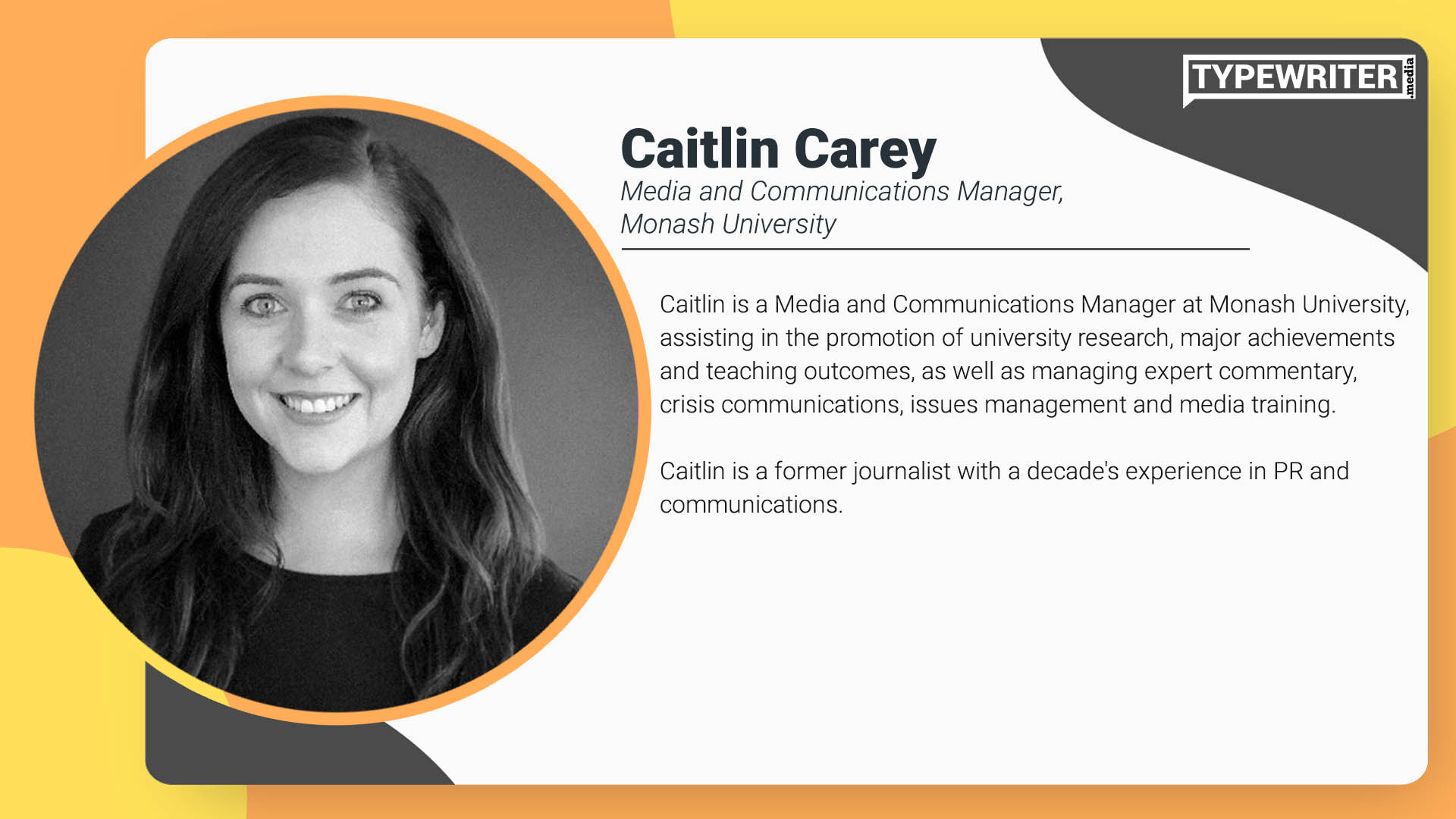
What made you choose the PR/Comms field as a career path?
I studied journalism at university and was a journalist for a couple of years before my first role in PR. I liked that the communications industry combined some of the elements I really enjoyed about journalism – working with people, writing, and learning about different topics – but within a slightly more controlled structure. I get to know the ins and outs of companies closely and focus on elevating them reputationally.
With journalism, I was learning a little about a lot but with PR / comms, I am exposed to a lot of detail but it’s more streamlined.
As a woman in the PR/Comms industry, what was your biggest learning over the last two years of the pandemic?
This isn’t so much about being a woman in the industry, but I learned just how integral communications and PR is. From daily press conferences by political leaders to the messaging workplaces globally had to disseminate as the pandemic took hold, communications were key.
Communications professionals were responsible for keeping stakeholders informed, safe and calm, as well as managing brand awareness and reputation as the pandemic wreaked havoc on companies’ finances.
For those of us working with the media, it was impossible to escape the onslaught of bad news, and to work through what that meant when engaging with journalists. For many of my stakeholders, a COVID-dominated news cycle meant we needed to be mindful of what we were putting forward for consideration – both in the sense of being of interest to the public broadly, but also appropriate in the context of the pandemic and what everyone was going through.
In this era where more and more people are looking for tech jobs, and fewer people are moving into the arts/humanities sector, what would be your advice to someone who is planning to pursue PR/Communication as a career?
This ties into my previous response but communications personnel are still integral for workplaces. Even as we enter another phase of the pandemic, there is still a huge requirement for support in re-engaging with stakeholders and target audiences.
The skills required to be a communications professional, while considered “soft skills”, are certainly not redundant in an evolving AI and automation dominated world.
Executives and company leaders rely on communications professionals daily to provide strategic advice, stakeholder engagement, manage reputational crises, liaise and engage with industry and government, connect with the media to elevate brands to new audiences, and much more.
If you are interested in pursuing a career in this industry, I would recommend looking into a university degree if you are able to. Beyond that, it’s about working hard, getting stuck in and being a reliable and calm source of advice and information for the stakeholders you work with. They need to know you’re there to protect them – and the companies they or you represent – when required.
Thought leaders you’d recommend to follow on social media.
I find these people inspiring:
- Jill Stark – Mental health advocate, media commentator, author, and former journalist
- Clementine Ford – Author, feminist, and former columnist
- Jamila Rizvi – Author, political commentator podcaster, and columnist
I invite you to join my small but awesome community. Just drop in your email below and I’ll send you awesome content whenever I can.



